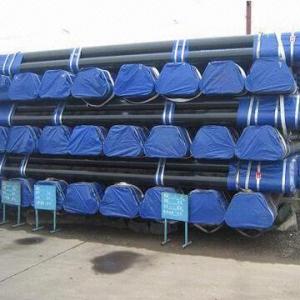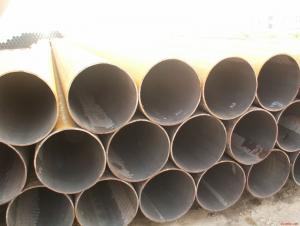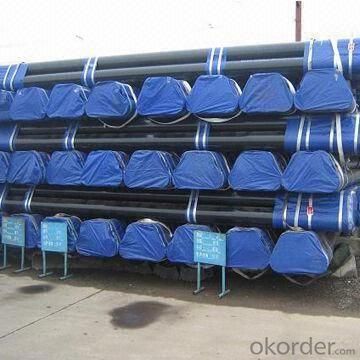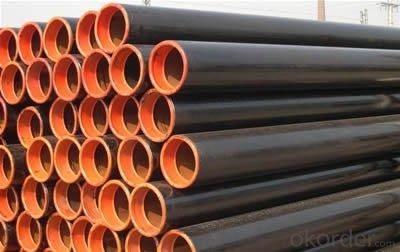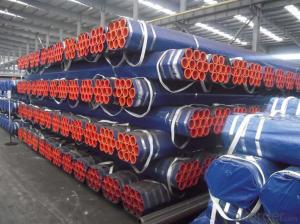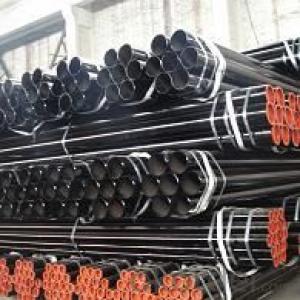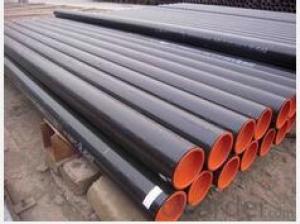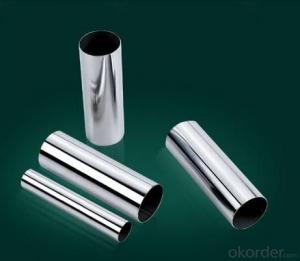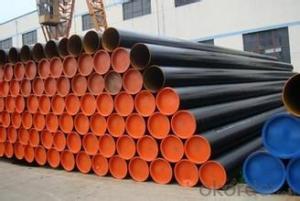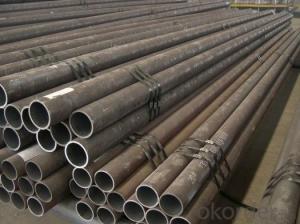Seamless Steel Tubes For Petroleum Cracking
- Loading Port:
- China Main Port
- Payment Terms:
- TT or LC
- Min Order Qty:
- 20mt m.t.
- Supply Capability:
- 5000 Tons Per Month m.t./month
OKorder Service Pledge
OKorder Financial Service
You Might Also Like
Standards and Application of Seamless Steel Tubes For Petroleum Cracking
DIN2391:Seamless Precision Steel Tubes for mechanical and automotive engineering.
EN10305-1:Seamless Steel Tubes for precision applications.
DIN17175:Seamless Tubes of Heat resistant Steels used in Boilers, Pressure vessels & equipment for service upto 600° C and at high pressures.
ASTM A106/SA106:Seamless Carbon Steel Pipes for High - Temperature Service.
ASTM A179/SA179:Seamless Cold-Drawn Low-Carbon Steel tubes for Heat-Exchanger and Condenser.
ASTM A192/SA192:Seamless Carbon Steel Boiler Tubes for High-Pressure Service.
ASTM A210/SA210:Seamless Medium-Carbon Steel Tubes for Boiler and Super heater.
Request a Supplier Assessment Report of Seamless Steel Tubes For Petroleum Cracking
You can either send the default request below or compose your own request to the supplier.
Usages of Seamless Steel Tubes For Petroleum Cracking
It can be used for transmitting a large number of fluid. Such as oil, natural gas, water and some solid materials. At the same time it can be widely used as the manufacture of various structural parts and mechanical parts,as well as building construction.
Package of Seamless Steel Tubes For Petroleum Cracking
Packaging/Delivery Wrapped in bundles with steel strips or according to customers' requirements.
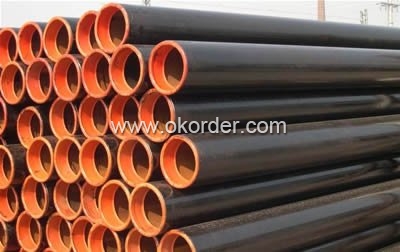
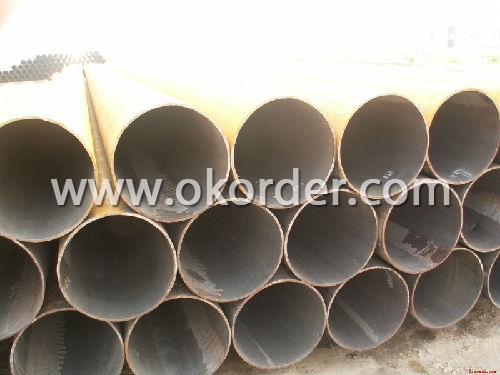
- Q: How are steel pipes recycled at the end of their life cycle?
- Steel pipes are typically recycled at the end of their life cycle through a process called steel recycling. This involves collecting the used pipes, separating them from other materials, and then melting them down to be formed into new steel products. The recycling process not only helps conserve valuable resources but also reduces the need for new steel production, making it an environmentally sustainable solution.
- Q: Can steel pipes be used for water supply systems?
- Yes, steel pipes can be used for water supply systems. Steel pipes are commonly used in water distribution systems due to their strength, durability, and resistance to corrosion. However, it is important to ensure that the steel pipes are properly coated or lined to prevent rusting and contamination of the water supply. Regular maintenance and inspection are also crucial to ensure the longevity and safety of steel pipes in water supply systems.
- Q: What are the different methods of pipe inspection for steel pipes?
- There are several methods of pipe inspection that can be used for steel pipes. Some of the commonly used methods are as follows: 1. Visual Inspection: This is the most basic form of pipe inspection where a trained inspector visually examines the exterior and interior of the pipe to identify any visible defects or abnormalities. This method is often used as a preliminary inspection before more advanced techniques are employed. 2. Magnetic Particle Inspection (MPI): MPI involves applying a magnetic field to the steel pipe and then applying iron particles to the surface. Any surface cracks or defects in the pipe will cause a leakage of magnetic flux, which can be detected by the inspector. This method is particularly effective in identifying surface defects in ferromagnetic materials. 3. Ultrasonic Testing (UT): UT is a non-destructive testing method that uses high-frequency sound waves to detect internal defects or anomalies in steel pipes. A transducer is used to send ultrasonic waves into the pipe, and the reflections or echoes of the sound waves are analyzed to determine the presence of defects such as corrosion, cracks, or wall thickness variations. 4. Radiographic Testing (RT): In this method, X-rays or gamma rays are used to create an image of the internal structure of the steel pipe. The X-rays or gamma rays pass through the pipe, and the resulting image can reveal any defects, such as cracks, corrosion, or weld discontinuities. This method is commonly used for inspecting welded joints. 5. Eddy Current Testing (ECT): ECT is a non-destructive testing technique that uses electromagnetic induction to detect surface and near-surface defects in steel pipes. A coil carrying an alternating current is passed over the pipe's surface, and any changes in the electrical conductivity or magnetic field caused by defects are detected and analyzed. 6. Acoustic Emission Testing (AET): AET is a method that detects and analyzes the high-frequency acoustic signals emitted by materials when they undergo deformation or damage. In the case of steel pipes, AET can be used to monitor and identify defects such as cracks, leaks, or corrosion by analyzing the acoustic signals emitted during service or under stress. These are just a few of the commonly used methods of pipe inspection for steel pipes. The choice of method depends on various factors such as the type of defect being looked for, the accessibility of the pipe, the desired level of sensitivity, and the cost and time constraints. It is often recommended to use a combination of inspection techniques to ensure a thorough assessment of the steel pipes.
- Q: How long do steel pipes typically last?
- Steel pipes typically last for several decades to over a century, depending on factors such as the quality of the steel, environmental conditions, and maintenance practices.
- Q: Can steel pipes be used for shipbuilding?
- Certainly, shipbuilding can make use of steel pipes. Steel is a widely employed material in ship construction owing to its robustness, endurance, and resistance to corrosion. Steel pipes serve multiple purposes in shipbuilding, encompassing the manufacture of the vessel's hull, superstructure, and various internal systems such as plumbing, ventilation, and fuel lines. The strength and structural integrity of steel pipes render them suitable for enduring the unforgiving conditions encountered at sea, including high pressures, extreme temperatures, and exposure to saltwater. Furthermore, steel pipes can be easily welded and shaped to meet the precise requirements of shipbuilding, making them an adaptable choice for this industry.
- Q: How are steel pipes used in the power generation sector?
- Steel pipes are commonly used in the power generation sector for various applications such as transporting steam, water, and other fluids within power plants. They are used for conveying fuel and combustion gases, as well as for cooling systems and turbine installations. Additionally, steel pipes are utilized in power plant construction for structural support and as part of the overall infrastructure.
- Q: What are the different types of threading on steel pipes?
- The different types of threading on steel pipes include tapered threads, straight threads, and buttress threads. Tapered threads are commonly used for pipes that will be screwed into fittings, while straight threads are typically used for pipes that will have a coupling or union attached. Buttress threads are designed for heavy-duty applications and provide increased strength and resistance to axial loads.
- Q: How are steel pipes used in the construction of stadiums?
- Steel pipes are used in the construction of stadiums for various purposes such as supporting the roof structure, creating the framework for seating areas, and providing a sturdy infrastructure for plumbing and ventilation systems.
- Q: What's the difference between the fastener type steel pipe scaffold, the floor type steel pipe scaffold and the overhanging type steel pipe scaffold?
- Classification is not the only way, fastener type steel pipe scaffolding is divided by force, and the latter 2 are classified according to the structure.
- Q: Can steel pipes be used for sewage systems?
- Yes, steel pipes can be used for sewage systems. Steel pipes are commonly used in sewage systems for their durability, strength, and resistance to corrosion. They are suitable for transporting sewage and wastewater, ensuring reliable and long-lasting performance.
1. Manufacturer Overview
| Location | Wuxi, China |
| Year Established | 1991 |
| Annual Output Value | 300,000Tons |
| Main Markets | Europe; Southeast Asia; etc. |
| Company Certifications | API 5L;API 5CT;API Q1;ISO/TS29001 |
2. Manufacturer Certificates
| a) Certification Name | |
| Range | |
| Reference | |
| Validity Period |
3. Manufacturer Capability
| a) Trade Capacity | |
| Nearest Port | Wuxi; Shanghai |
| Export Percentage | 41% - 50% |
| No.of Employees in Trade Department | 3900-4000 People |
| Language Spoken: | English; Chinese; Spanish |
| b) Factory Information | |
| Factory Size: | Above 450,000 square meters |
| No. of Production Lines | Above 10 |
| Contract Manufacturing | OEM Service Offered;Design Service Offered |
| Product Price Range | Average |
Send your message to us
Seamless Steel Tubes For Petroleum Cracking
- Loading Port:
- China Main Port
- Payment Terms:
- TT or LC
- Min Order Qty:
- 20mt m.t.
- Supply Capability:
- 5000 Tons Per Month m.t./month
OKorder Service Pledge
OKorder Financial Service
Similar products
Hot products
Hot Searches
Related keywords
